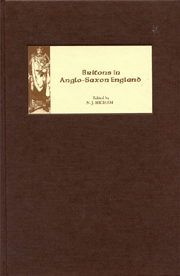Book contents
- Frontmatter
- Contents
- List of Illustrations
- List of Tables
- Contributors
- Dedication
- Acknowledgements
- Abbreviations
- 1 Britons in Anglo-Saxon England: An Introduction
- 2 Anglo-Saxon Attitudes
- 3 Forgetting the Britons in Victorian Anglo-Saxon Archaeology
- 4 Romano-British Metalworking and the Anglo-Saxons
- 5 Invisible Britons, Gallo-Romans and Russians: Perspectives on Culture Change
- 6 Historical Narrative as Cultural Politics: Rome, ‘British-ness’ and ‘English-ness’
- 7 British Wives and Slaves? Possible Romano-British Techniques in ‘Women's Work’
- 8 Early Mercia and the Britons
- 9 Britons in Early Wessex: The Evidence of the Law Code of Ine
- 10 Apartheid and Economics in Anglo-Saxon England
- 11 Welsh Territories and Welsh Identities in Late Anglo-Saxon England
- 12 Some Welshmen in Domesday Book and Beyond: Aspects of Anglo-Welsh Relations in the Eleventh Century
- 13 What Britons Spoke around 400 AD
- 14 Invisible Britons: The View from Linguistics
- 15 Why Don't the English Speak Welsh?
- 16 Place-Names and the Saxon Conquest of Devon and Cornwall
- 17 Mapping Early Medieval Language Change in South-West England
- Index
12 - Some Welshmen in Domesday Book and Beyond: Aspects of Anglo-Welsh Relations in the Eleventh Century
Published online by Cambridge University Press: 12 September 2012
- Frontmatter
- Contents
- List of Illustrations
- List of Tables
- Contributors
- Dedication
- Acknowledgements
- Abbreviations
- 1 Britons in Anglo-Saxon England: An Introduction
- 2 Anglo-Saxon Attitudes
- 3 Forgetting the Britons in Victorian Anglo-Saxon Archaeology
- 4 Romano-British Metalworking and the Anglo-Saxons
- 5 Invisible Britons, Gallo-Romans and Russians: Perspectives on Culture Change
- 6 Historical Narrative as Cultural Politics: Rome, ‘British-ness’ and ‘English-ness’
- 7 British Wives and Slaves? Possible Romano-British Techniques in ‘Women's Work’
- 8 Early Mercia and the Britons
- 9 Britons in Early Wessex: The Evidence of the Law Code of Ine
- 10 Apartheid and Economics in Anglo-Saxon England
- 11 Welsh Territories and Welsh Identities in Late Anglo-Saxon England
- 12 Some Welshmen in Domesday Book and Beyond: Aspects of Anglo-Welsh Relations in the Eleventh Century
- 13 What Britons Spoke around 400 AD
- 14 Invisible Britons: The View from Linguistics
- 15 Why Don't the English Speak Welsh?
- 16 Place-Names and the Saxon Conquest of Devon and Cornwall
- 17 Mapping Early Medieval Language Change in South-West England
- Index
Summary
WHEREAS the importance for the study of eleventh-century English history of William the Conqueror's great land survey known, since the twelfth century, as ‘Domesday Book’ hardly needs stating, its value as a source for the history of Wales during the same period is perhaps less self-evident. True, Welsh historians from Sir John Lloyd onwards have drawn on the survey for their historical reconstructions, but most of these studies have tended to ‘sample’ Domesday Book in order to supplement information drawn from their other – main – primary sources. While there are notable exceptions to this rule, a thorough analysis of Wales and Welshmen in Domesday Book per se remains to be undertaken. My purpose in the present paper is to make a contribution towards redressing this historiographical deficiency, by offering a prosopographical analysis of the Welsh individuals who occur in Domesday Book and especially those who occur before the Norman Conquest – that is, tempore regis Edwardi, or TRE as it is usually indicated in the text itself. The starting point is the data presented in Table 12.1 below: that is, a total of seventy-nine entries from Domesday Book (both TRE and for 1086) which may be considered in some way to refer to Welshmen. The criteria for compiling this list are onomastic and geographical, though as might be expected neither is straightforward and both require some preliminary comment.
- Type
- Chapter
- Information
- Britons in Anglo-Saxon England , pp. 144 - 164Publisher: Boydell & BrewerPrint publication year: 2007



